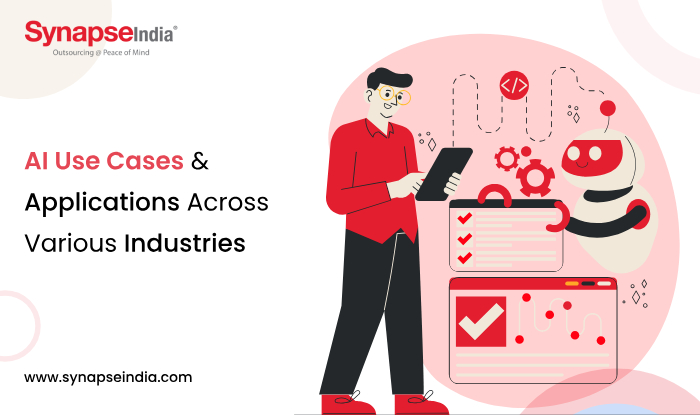 14 Mar 2024
14 Mar 2024“Artificial Intelligence (AI) has become ubiquitous across industries, transforming processes and driving innovation. AI is revolutionizing operations, enhancing decision-making, and driving progress toward a smarter, more efficient future.”

Artificial Intelligence is shaping the world in an unprecedented way. From finance to healthcare, AI use cases is everywhere, creating sustainability in every sector, due to its ever-evolving potential and countless changes that have shaped the industries. The applications associated with AI are varied, with each sector implementing processes, that serve better outcomes and increase efficiency. At its core, AI performs daily tasks easily with the only requirement of human intelligence, including decision-making and learning. AI applications are filled with a vast amount of data and algorithms that can easily analyze and interpret that data to make decisions and predictions.
Artificial intelligence automates tasks that involve creating with the ability to execute tasks that require human intelligence. It involves problem-solving, reasoning, perception, decision-making, and language understanding. AI applications stimulate the intelligence of humans to perform tasks, analyze data make decisions. Businesses AI use cases to automate their processes, enhance customer experience, optimize operations, and make decisions strategically.
The AI use cases have been implemented across every industry, and how it has transformed every sector is breathtaking. Let’s understand some of the important use cases of each industry.

AI applications in healthcare help analyze CT scans and X-rays with great speed and accuracy. It helps in making easier and faster diagnosis of illness. In the healthcare industry, AI also helps in detecting lung nodules, and detect osteoporosis in X-rays. Apart from helping with CT scans and X-rays, AI also uses patient’s data, lifestyle, and genetic information to identify prolonged illnesses based on creating a genetic profile and identifying it at earlier stages, such as diabetes and heart diseases. AI applications in healthcare keep health records to find trends and patterns to anticipate illness risks can be implemented with preventative efforts.
Artificial intelligence in retail analyzes behavior, preferences, and previous purchases, which provides personalized recommendations of products based on individual choices. This increases client engagement, and browsing experiences, and promotes revenue by providing goods that are personalized. Retailers use algorithms connected with AI, that help in monitoring real-time market preferences, client demand, and rival pricing. All AI use cases allow for dynamic modifications in terms of pricing, and strategies. Chatbots enabled with artificial intelligence in retail also manage inquiries from clients, give immediate responses, and help in tracking orders.
AI use cases in manufacturing play a very crucial role where machine learning algorithms analyze historical data to predict equipment failures before they occur. This proactive approach minimizes downtime, reduces maintenance costs, and enhances overall equipment effectiveness (OEE). keeping AI for manufacturing can consistently ensure product quality, reduce waste, and upgrade customer satisfaction. AI applications are also driving process optimization in manufacturing facilities. Machine learning algorithms analyze vast amounts of production data to identify inefficiencies and optimize workflows. By making the production process optimized manufacturers can increase throughput, reduce cycle times, and improve resource use. AI in manufacturing helps to achieve greater efficiency, productivity, and competitiveness.
A significant shift takes place in the banking and financial services sector that revolutionizes customer experiences, planned risk management, and operational efficiency. AI-enabled chatbots and virtual assistants provide support, solve queries of customers, assist with transactions, and offer personalized product recommendations. All these factors depend on individual preferences and behavior. AI is also helpful in fraud detection and security in financial institutions. Machine learning algorithms analyze vast amounts of transactional data in real time to identify suspicious activities and potential fraud patterns. AI-powered analytics has transformed investment management and wealth advisory services.

With the adoption of artificial intelligence (AI) across various industries has evolved into an era of innovation and efficiency. From healthcare and finance to manufacturing and entertainment, AI use cases and powered solutions are revolutionizing processes, enhancing decision-making, and driving business growth. As AI continues to evolve and mature, its potential to transform industries and reshape the way we live and work is virtually limitless. With ongoing advancements and innovations, AI applications will undoubtedly play an increasingly pivotal role in shaping the future of business and society.


